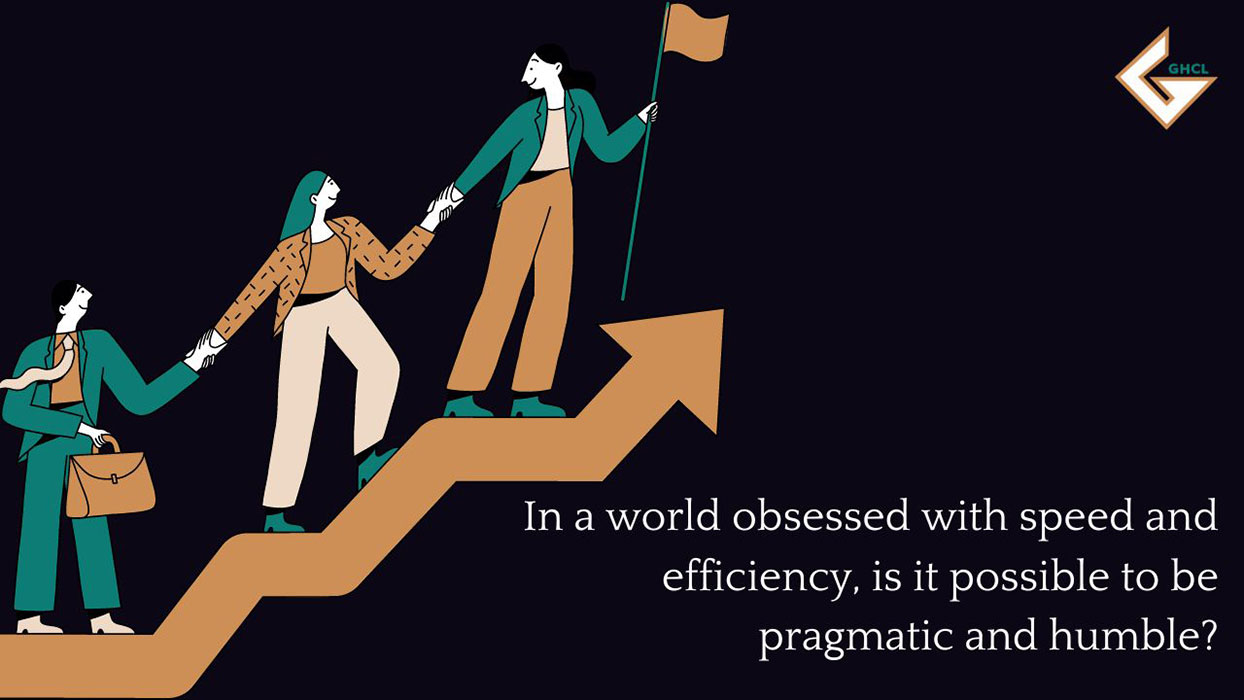In a world obsessed with speed and efficiency, is it possible to be pragmatic and humble?

What are the potential benefits and challenges of this combination?
In a world driven by speed and efficiency and characterised by technological advancements, changing consumer behaviour and economic uncertainty, the virtues of pragmatism and humility often get overlooked. Yet, these qualities are essential for businesses to navigate the complexities of the modern landscape.
Growth in these uncertain times, whether personal or organizational, often requires a delicate balance of pragmatism and humility.
Pragmatism or a practical approach to problem solving allows organizations to adapt to changing circumstances and take a realistic approach with real-world solutions, emphasizing on what works, rather than theoretical principles.
Humility creates a culture that values openness, respect and a willingness to learn from others. This in turn creates a collaborative and supportive environment where employees and other stakeholders feel empowered to share their ideas and perspectives. It also ensures effective decision-making as leaders are more likely to consider diverse perspectives and the pros and cons of different options carefully.
The Potent Combination
When combined, pragmatism and humility create a powerful synergy that leads to improved efficiencies, reduced costs, and enhanced innovation. It helps create stronger customer relationships, greater resilience and a culture of problem-solving, adaptability and collaboration.
Organisations can course correct when needed because they have pragmatic foresight and the humility to accept that their strategy needs revisiting. Teams understand that their initial thoughts/ strategies may have worked on paper, but practically, given the competitive business scenario, it would be prudent to reconsider.
Case in Point
Our Home Textiles Divestment: In 2021, a strategic assessment revealed that our Home Textiles business needed a different strategy to continue being profitable. Despite its prominence in the Home Textiles sector, its requirements for growth were unlike the Soda ash business. In order to maximize value for our stakeholders, we made this difficult, yet pragmatic decision to divest the business. We had realised that this would allow both businesses to focus on their respective strengths and respond more effectively to market opportunities.
The separation process was emotionally challenging, involving careful consideration of various stakeholder perspectives. It did reduce our speed but then again, that was never our focus, our only concern was to ensure that we were creating value for all our stakeholders in the long term.
Our organisational strategy: Another highlight of our organisational strategy is prioritizing long-term sustainability, social responsibility, and ethical business practices. Our organisational values of Respect, Trust, Ownership and Integrated Team work are founded on pragmatism and a grounded perspective. Staying humble and pragmatic has helped us realise the importance of giving back to society, focus on building strong stakeholder relationships and contributing to the development of the nation.
Our Learnings
In order to create value, a reality-based approach with an understanding of the limitations and constraints is essential to adapt as circumstances change. We also realised that humility became our main catalyst for learning. Our inherent characteristic of openness to feedback, made it easier to prioritize the organization’s goals over personal ambitions. Creating a more collaborative and supportive environment based on a mind-set of lifelong learning and a commitment to continuous improvement.
We learnt that humility starts with a leadership team that encourages a culture of “knowing what we don’t know”. Which can be inculcated through supportive work environment, building trust, and enhancing communication within teams. Thus, encouraging diversity and inclusion, creating a safe space for different points of view and positively impacting engagement, job satisfaction and performance within the organisation.
A Word of Caution: The Dangers of Excess
Benjamin Franklin, a prominent American statesman, scientist, inventor, and writer said, “Too much of anything is bad, even of good things.”
Excessive Pragmatism can stifle creativity and prevent organizations from taking calculated risks necessary for growth and innovation. It may also lead to a focus on immediate, tangible results, overlooking long-term strategic goals.
Excessive Humility can prevent individuals from being assertive enough to stand up for their beliefs, leading to missed opportunities or suboptimal outcomes. It may also create a reluctance to make decisions or take action for their ideas.
In Conclusion
Leaders play a crucial role in fostering a culture of pragmatism and humility within their organizations and teams. They lead by example, are open to feedback and encourage diverse perspectives. Leaders must motivate their teams to continually develop their skills and knowledge, view setbacks as learning experiences and reward collaboration and team work.
A careful combination of pragmatism and humility can help organizations weather challenges and setbacks, as they adapt to changing landscapes and learn from their experiences.